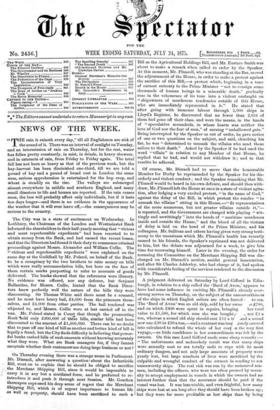On Thursday evening there was a strange scene in Parliament.
Mr. Disraeli, after answering a question' about the Infanticide Bill, went on to explain that he should be obliged to sacrifice the Merchant Shipping Bill, since it would be impossible to ; carry it in any but a mutilated form, and he preferred to re- introduce it and push it through next Session. Mr. Goschen thereupon expressed his deep sense of regret that the Merchant Shipping Bill, which is of urgent importance to human life as well as property, should have been sacrificed to such a Bill as the Agricultural Holdings Bill, and Mr. Eustace Smith was about to make a remark when called to order by the Speaker. At this moment, Mr. Plimsoll, who was standing at the Bar, moved the adjournment of the House, in order to make a protest against the sacrifice of this Bill,—a protest which, beginning in a tone of earnest entreaty to the Prime Minister "not to consign some thousands of human beings to a miserable death," gradually rose in the vehemence of its tone into a violent onslaught on "shipowners of murderous tendencies outside of this House, who are immediately represented in it." He stated that after going with immense labour through 5,000 ships in Lloyd's Register, he discovered that no fewer than 2,654 of them had gone off their class, and were the means, in the hands of "speculative scoundrels, in whose hearts was neither the love of God nor the fear of men," of earning "unhallowed gain." Being interrupted by the Speaker as out of order, he gave notice of one or two questions on the subject, and said, clenching his fist, he was "determined to unmask the villains who send these sailors to their death." Asked by the Speaker if he had used the word "villain" in relation to any Member of that House, he replied that he had, and would not withdraw it ; and to that resolve he adhered.


































